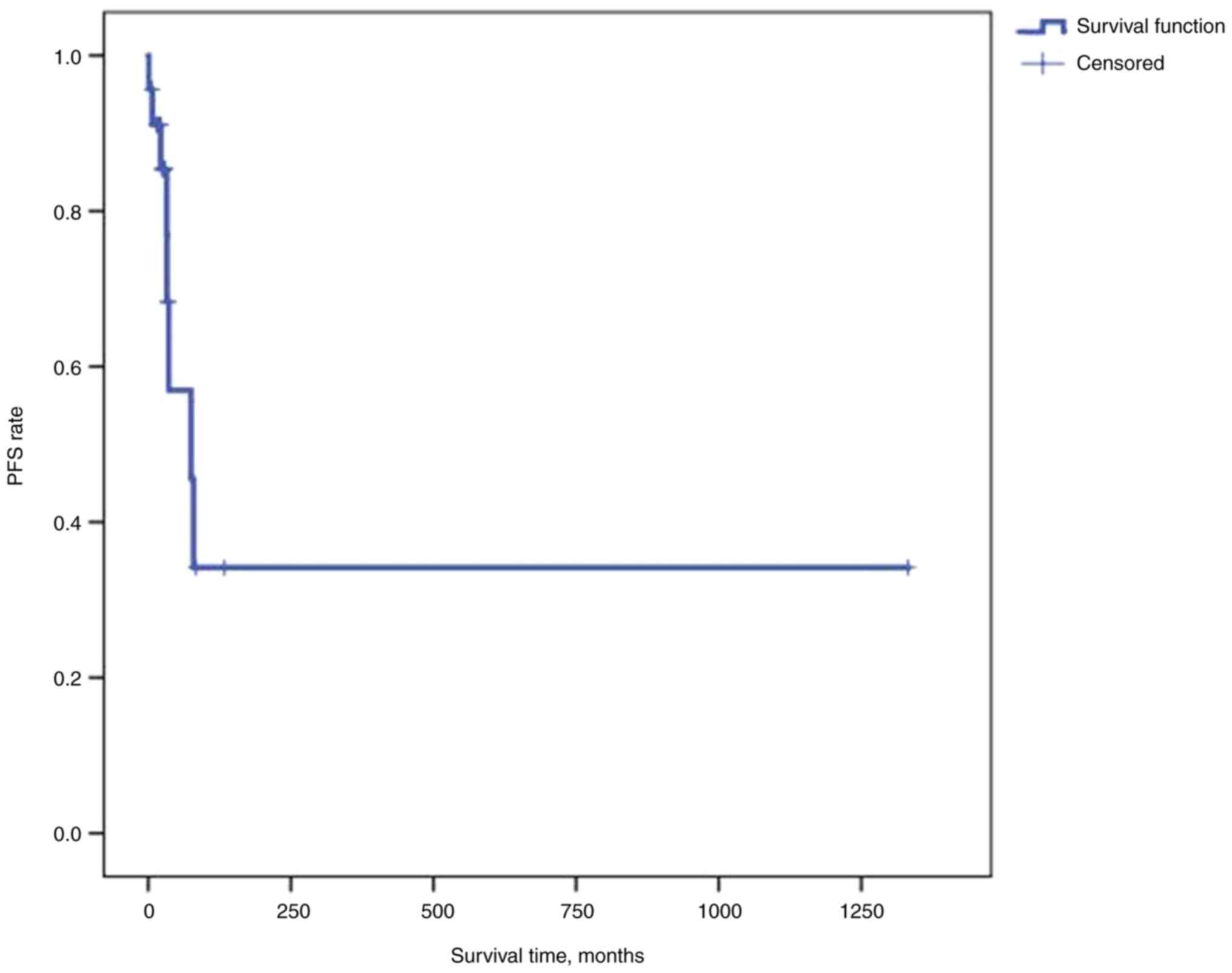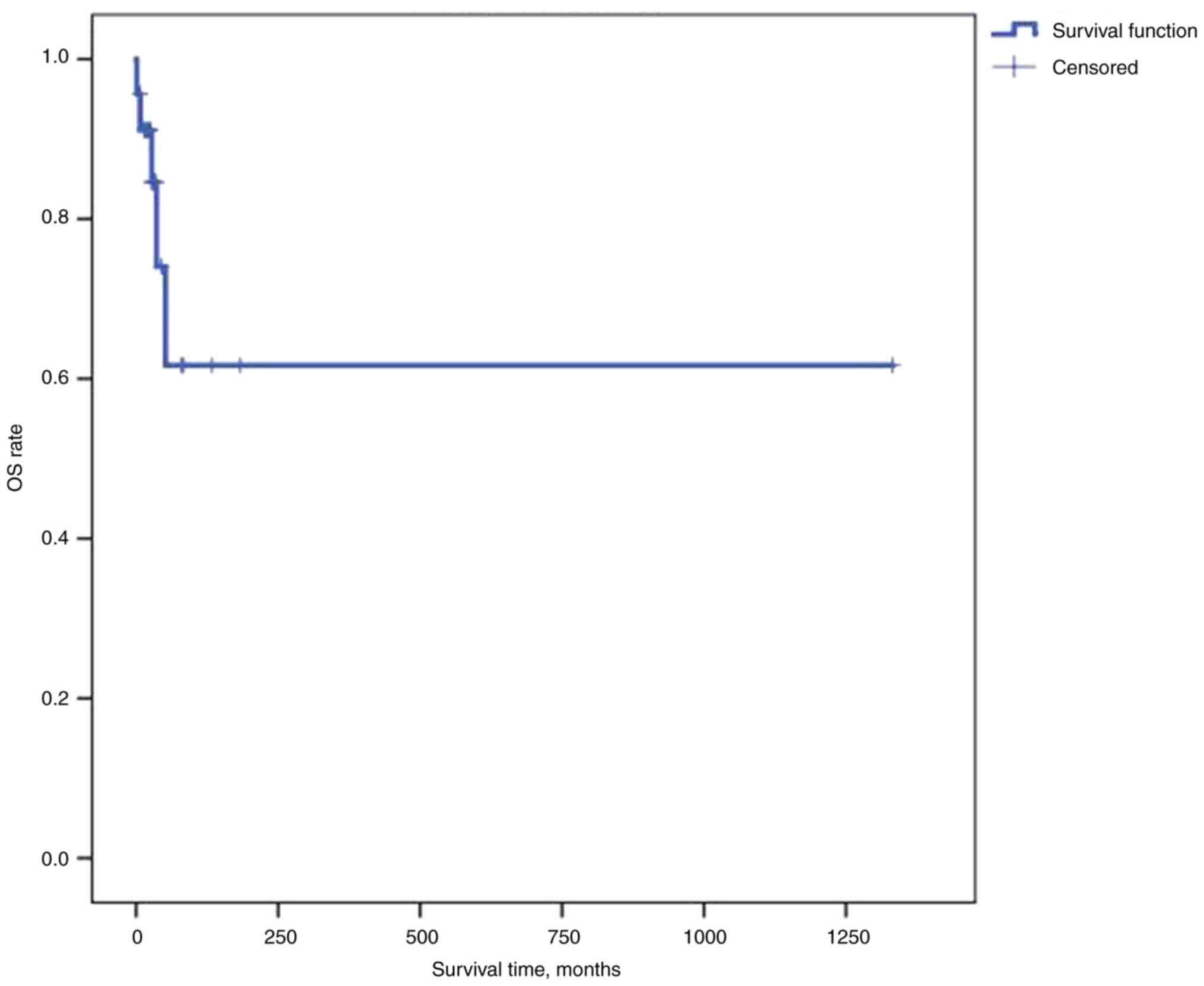|
1
|
Slomovitz B, Gourley C, Carey MS, Malpica
A, Shih IM, Huntsman D, Fader AN, Grisham RN, Schlumbrecht M, Sun
CC, et al: Low-grade serous ovarian cancer: State of the science.
Gynecol Oncol. 156:715–725. 2020.PubMed/NCBI View Article : Google Scholar
|
|
2
|
Zwimpfer TA, Tal O, Geissler F, Coelho R,
Rimmer N, Jacob F and Heinzelmann-Schwarz V: Low grade serous
ovarian cancer-a rare disease with increasing therapeutic options.
Cancer Treat Rev. 112(102497)2023.PubMed/NCBI View Article : Google Scholar
|
|
3
|
Matsuo K, Machida H, Grubbs BH, Matsuzaki
S, Klar M, Roman LD, Sood AK and Gershenson DM: Diagnosis-shift
between low-grade serous ovarian cancer and serous borderline
ovarian tumor: A population-based study. Gynecol Oncol. 157:21–28.
2020.PubMed/NCBI View Article : Google Scholar
|
|
4
|
Babaier A, Mal H, Alselwi W and Ghatage P:
Low-grade serous carcinoma of the ovary: The current status.
Diagnostics. 12(458)2022.PubMed/NCBI View Article : Google Scholar
|
|
5
|
McKenney JK, Gilks CB, Kalloger S and
Longacre TA: Classification of extraovarian implants in patients
with ovarian serous borderline tumors (tumors of low malignant
potential) based on clinical outcome. Am J Surg Pathol.
40:1155–1164. 2016.PubMed/NCBI View Article : Google Scholar
|
|
6
|
Kaldawy A, Segev Y, Lavie O, Auslender R,
Sopik V and Narod SA: Low-grade serous ovarian cancer: A review.
Gynecol Oncol. 143:433–438. 2016.PubMed/NCBI View Article : Google Scholar
|
|
7
|
Canaz E, Grabowski JP, Richter R, Braicu
EI, Chekerov R and Sehouli J: Survival and prognostic factors in
patients with recurrent low-grade epithelial ovarian cancer: An
analysis of five prospective phase II/III trials of NOGGO metadata
base. Gynecol Oncol. 154:539–546. 2019.PubMed/NCBI View Article : Google Scholar
|
|
8
|
Gershenson DM, Bodurka DC, Lu KH, Nathan
LC, Milojevic L, Wong KK, Malpica A and Sun CC: Impact of age and
primary disease site on outcome in women with low-grade serous
carcinoma of the ovary or peritoneum: Results of a large
single-institution registry of a rare tumor. J Clin Oncol.
33:2675–2682. 2015.PubMed/NCBI View Article : Google Scholar
|
|
9
|
Shvartsman HS, Sun CC, Bodurka DC, Mahajan
V, Crispens M, Lu KH, Deavers MT, Malpica A, Silva EG and
Gershenson DM: Comparison of the clinical behavior of newly
diagnosed stages II-IV low-grade serous carcinoma of the ovary with
that of serous ovarian tumors of low malignant potential that recur
as low-grade serous carcinoma. Gynecol Oncol. 105:625–629.
2007.PubMed/NCBI View Article : Google Scholar
|
|
10
|
Ricciardi E, Baert T, Ataseven B, Heitz F,
Prader S, Bommert M, Schneider S, du Bois A and Harter P: Low-grade
Serous ovarian carcinoma. Geburtshilfe Frauenheilkd. 78:972–976.
2018.PubMed/NCBI View Article : Google Scholar
|
|
11
|
Gadducci A and Cosio S: Therapeutic
approach to low-grade serous ovarian carcinoma: State of art and
perspectives of clinical research. Cancers (Basel).
12(1336)2020.PubMed/NCBI View Article : Google Scholar
|
|
12
|
Schlumbrecht MP, Sun CC, Wong KN, Broaddus
RR, Gershenson DM and Bodurka DC: Clinicodemographic factors
influencing outcomes in patients with low-grade serous ovarian
carcinoma. Cancer. 117:3741–3749. 2011.PubMed/NCBI View Article : Google Scholar
|
|
13
|
Grabowski JP, Harter P, Heitz F,
Pujade-Lauraine E, Reuss A, Kristensen G, Ray-Coquard I, Heitz J,
Traut A, Pfisterer J and du Bois A: Operability and chemotherapy
responsiveness in advanced low-grade serous ovarian cancer. An
analysis of the AGO Study Group metadatabase. Gynecol Oncol.
140:457–462. 2016.PubMed/NCBI View Article : Google Scholar
|
|
14
|
Bristow RE, Gossett DR, Shook DR, Zahurak
ML, Tomacruz RS, Armstrong DK and Montz FJ: Recurrent
micropapillary serous ovarian carcinoma. Cancer. 95:791–800.
2002.PubMed/NCBI View Article : Google Scholar
|
|
15
|
Gershenson DM, Sun CC, Bodurka D, Coleman
RL, Lu KH, Sood AK, Deavers M, Malpica AL and Kavanagh JJ:
Recurrent low-grade serous ovarian carcinoma is relatively
chemoresistant. Gynecol Oncol. 114:48–52. 2009.PubMed/NCBI View Article : Google Scholar
|
|
16
|
Escobar J, Klimowicz AC, Dean M, Chu P,
Nation JG, Nelson GS, Ghatage P, Kalloger SE and Köbel M:
Quantification of ER/PR expression in ovarian low-grade serous
carcinoma. Gynecol Oncol. 128:371–376. 2013.PubMed/NCBI View Article : Google Scholar
|
|
17
|
Fader AN, Bergstrom J, Jernigan A, Tanner
EJ III, Roche KL, Stone RL, Levinson KL, Ricci S, Wethingon S, Wang
TL, et al: Primary cytoreductive surgery and adjuvant hormonal
monotherapy in women with advanced low-grade serous ovarian
carcinoma: Reducing overtreatment without compromising survival?
Gynecol Oncol. 147:85–91. 2017.PubMed/NCBI View Article : Google Scholar
|
|
18
|
Gershenson DM, Bodurka DC, Coleman RL, Lu
KH, Malpica A and Sun CC: Hormonal maintenance therapy for women
with low-grade serous cancer of the ovary or peritoneum. J Clin
Oncol. 35:1103–1111. 2017.PubMed/NCBI View Article : Google Scholar
|
|
19
|
Tang M, O'Connell RL, Amant F, Beale P,
McNally O, Sjoquist KM, Grant P, Davis A, Sykes P, Mileshkin L, et
al: PARAGON: A phase II study of anastrozole in patients with
estrogen receptor-positive recurrent/metastatic low-grade ovarian
cancers and serous borderline ovarian tumors. Gynecol Oncol.
154:531–538. 2019.PubMed/NCBI View Article : Google Scholar
|
|
20
|
Prat J: FIGO's staging classification for
cancer of the ovary, fallopian tube, and peritoneum: Abridged
republication. J Gynecol Oncol. 26(87)2015.PubMed/NCBI View Article : Google Scholar
|
|
21
|
Azam F, Latif MF, Farooq A, Tirmazy SH,
AlShahrani S, Bashir S and Bukhari N: Performance status assessment
by using ECOG (eastern cooperative oncology group) score for cancer
patients by oncology healthcare professionals. Case Rep Oncol.
12:728–736. 2019.PubMed/NCBI View Article : Google Scholar
|
|
22
|
Purnell JQ: Definitions, Classification,
and Epidemiology of Obesity, 2000.
|
|
23
|
Olawaiye AB, Baker TP, Washington MK and
Mutch DG: The new (version 9) American joint committee on cancer
tumor, node, metastasis staging for cervical cancer. CA Cancer J
Clin. 71:287–298. 2021.PubMed/NCBI View Article : Google Scholar
|
|
24
|
Eisenhauer EA, Therasse P, Bogaerts J,
Schwartz LH, Sargent D, Ford R, Dancey J, Arbuck S, Gwyther S,
Mooney M, et al: New response evaluation criteria in solid tumours:
Revised RECIST guideline (version 1.1). Eur J Cancer. 45:228–247.
2009.PubMed/NCBI View Article : Google Scholar
|
|
25
|
Di Lorenzo P, Conteduca V, Scarpi E,
Adorni M, Multinu F, Garbi A, Betella I, Grassi T, Bianchi T, Di
Martino G, et al: Advanced low grade serous ovarian cancer: A
retrospective analysis of surgical and chemotherapeutic management
in two high volume oncological centers. Front Oncol.
12(970918)2022.PubMed/NCBI View Article : Google Scholar
|
|
26
|
Olsen CM, Green AC, Whiteman DC, Sadeghi
S, Kolahdooz F and Webb PM: Obesity and the risk of epithelial
ovarian cancer: A systematic review and meta-analysis. Eur J
Cancer. 43:690–709. 2007.PubMed/NCBI View Article : Google Scholar
|
|
27
|
Liu Z, Zhang TT, Zhao JJ, Qi SF, Du P, Liu
DW and Tian QB: The association between overweight, obesity and
ovarian cancer: A meta-analysis. Jpn J Clin Oncol. 45:1107–1115.
2015.PubMed/NCBI View Article : Google Scholar
|
|
28
|
Cobb L and Gershenson D: Novel
therapeutics in low-grade serous ovarian cancer. Int J Gynecol
Cancer. 33:377–384. 2023.PubMed/NCBI View Article : Google Scholar
|
|
29
|
Gockley A, Melamed A, Bregar AJ, Clemmer
JT, Birrer M, Schorge JO, Del Carmen MG and Rauh-Hain JA: Outcomes
of women with high-grade and low-grade advanced-stage serous
epithelial ovarian cancer. Obstet Gynecol. 129:439–447.
2017.PubMed/NCBI View Article : Google Scholar
|
|
30
|
Ferriss JS, Java JJ, Bookman MA, Fleming
GF, Monk BJ, Walker JL, Homesley HD, Fowler J, Greer BE, Boente MP
and Burger RA: Ascites predicts treatment benefit of bevacizumab in
front-line therapy of advanced epithelial ovarian, fallopian tube
and peritoneal cancers: An NRG oncology/GOG study. Gynecol Oncol.
139:17–22. 2015.PubMed/NCBI View Article : Google Scholar
|
|
31
|
Fader AN, Java J, Ueda S, Bristow RE,
Armstrong DK, Bookman MA and Gershenson DM: Gynecologic Oncology
Group (GOG)*. Survival in women with grade 1 serous ovarian
carcinoma. Obstet Gynecol. 122:225–232. 2013.PubMed/NCBI View Article : Google Scholar
|
|
32
|
Kimyon Comert G, Turkmen O, Mesci CG,
Karalok A, Sever O, Sinaci S, Boran N, Basaran D and Turan T:
Maximal cytoreduction is related to improved disease-free survival
in low-grade ovarian serous carcinoma. Tumori. 105:259–264.
2019.PubMed/NCBI View Article : Google Scholar
|
|
33
|
Schnack TH, Sørensen RD, Nedergaard L and
Høgdall C: Demographic clinical and prognostic characteristics of
primary ovarian, peritoneal and tubal adenocarcinomas of serous
histology-a prospective comparative study. Gynecol Oncol.
135:278–84. 2014.PubMed/NCBI View Article : Google Scholar
|
|
34
|
Usach I, Blansit K, Chen LM, Ueda S,
Brooks R, Kapp DS and Chan JK: Survival differences in women with
serous tubal, ovarian, peritoneal, and uterine carcinomas. Am J
Obstet Gynecol. 212:188.e1–6. 2015.PubMed/NCBI View Article : Google Scholar
|
|
35
|
Teneriello MG, Ebina M, Linnoila RI, Henry
M, Nash JD, Park RC and Birrer MJ: p53 and Ki-ras gene mutations in
epithelial ovarian neoplasms. Cancer Res. 53:3103–3108.
1993.PubMed/NCBI
|
|
36
|
Grisham RN, Iyer G, Garg K, Delair D,
Hyman DM, Zhou Q, Iasonos A, Berger MF, Dao F, Spriggs DR, et al:
BRAF Mutation is associated with early stage disease and improved
outcome in patients with low-grade serous ovarian cancer. Cancer.
119:548–554. 2013.PubMed/NCBI View Article : Google Scholar
|
|
37
|
Gershenson DM, Miller A, Brady WE, Paul J,
Carty K, Rodgers W, Millan D, Coleman RL, Moore KN, Banerjee S, et
al: Trametinib versus standard of care in patients with recurrent
low-grade serous ovarian cancer (GOG 281/LOGS): An international,
randomised, open-label, multicentre, phase 2/3 trial. Lancet.
399:541–553. 2022.PubMed/NCBI View Article : Google Scholar
|
|
38
|
Farley J, Brady WE, Vathipadiekal V,
Lankes HA, Coleman R, Morgan MA, Mannel R, Yamada SD, Mutch D,
Rodgers WH, et al: Selumetinib in women with recurrent low-grade
serous carcinoma of the ovary or peritoneum: an open-label,
single-arm, phase 2 study. Lancet Oncol. 14:134–140.
2013.PubMed/NCBI View Article : Google Scholar
|
|
39
|
Elshenawy MA, Badran A, Juhani AF Al,
Alshamsan B, Alsagaih Y, Alqayidi AA, Sheikh A, Alhassan T,
Maghfoor I, Elshentenawy A and Alhusseini H: 391 outcome and
prognostic factors of low-grade serous ovarian cancers: An
observational retrospective study. Int J Gynecol Cancer. 34 (Suppl
1):A324.2–A324. 2024.
|
















